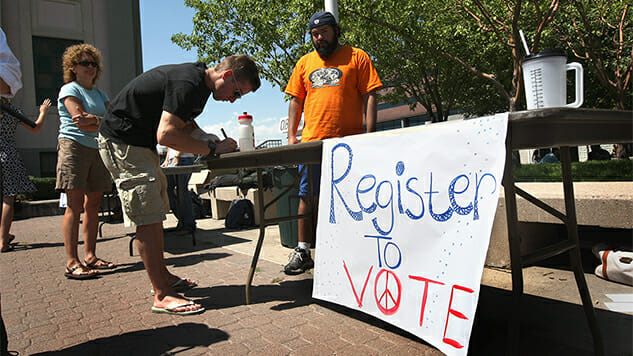Voter Suppression in Georgia and Wisconsin Could Change the 2020 Election
Photo by John Moore/Getty Politics News 2020 Election
Georgia and Wisconsin voters have a lot to worry about in the upcoming 2020 election, as Daily Kos reports, and that concern doesn’t just apply to the candidates. Voter roll purges are occurring in both states, and when accompanied by polling site closures and consolidations, voter ID laws and other suppressive actions by election officials, these purges could have a significant impact on the 2020 election.
In Georgia, officials have often rushed to purge voters but are then suspiciously slow to add new registrants. For example, ahead of the 2018 midterm election, Georgia’s then Secretary of State, now Governor Brian Kemp purged over 1 million people from Georgia voter rolls and then delayed adding newly registered voters. Current Georgia Secretary of State Brad Raffensperger has continued the pattern ahead of the 2020 election, removing more than 300,000 registered voters from the rolls as of Dec. 16.
Aimee Castenell, Southeastern Region Communications Director for the Working Families Party, is an example of someone shut out from their right to vote. Castenell happened to check her voter registration status and saw that she was no longer registered. In Georgia, election officials follow a “use it or lose it” policy, meaning Georgia voters must utilize their right to vote within a certain number of election cycles in order to stay on the rolls.
Yet Castenell, like many others in her shoes, is an active voter, last voting in the 2018 elections, which should have kept her safe from the purging policy. She wasn’t, nor was she ever informed her voter’s registration would be purged. Castenell’s situation aligns with a similarly shady story from Dr. Lindsay Holliday, from Macon, Ga. Holliday was notified that his right to vote was going to be taken away, but even so, the process to keep his registration was riddled with obstacles.
The worst part of the video is that the card needed for Holliday to renew his voter’s registration was called “undeliverable,” making it blatantly obvious that election officials were creating a complex process on purpose. The impact of such voter suppression was made clear in the 2018 governor election, as Stacey Abrams lost to Kemp himself.
“Georgians should not lose their right to vote simply because they have not expressed that right in recent elections, and Georgia’s practice of removing voters who have declined to participate in recent elections violates the United States Constitution,” said Fair Fight Action CEO Lauren Groh-Wargo in a statement. Fair Fight Action is an advocacy organization that addresses voting rights violations stemming from the 2018 election. The work of groups like Fair Fight Action is increasingly relevant in the coming months, as voters need to ensure that their registrations are activated ahead of the 2020 election.
Meanwhile, voter turmoil is occurring in Wisconsin, as well. In October, the Wisconsin Election Commission was sued by a conservative group alleging its process for a planned purge of more than 230,000 registered voters did not comply with state law. The WEC was pulling a similar strategy to Georgia election officials: Voters who were believed to have moved were required to re-register or face deactivation of their registration. The purging process becomes more political when one takes a look at who was threatened to have their voters rights expunged.
From a bird’s eye view of the areas targeted, one could see that more mail was being sent to predominantly blue communities in Wisconsin. The Milwaukee Journal Sentinel reported that 55% of the letters were sent to areas where former Secretary Hilary Clinton won more votes than Donald Trump in the 2016 presidential election. More than one fifth of the voters set to be purged hailed from Milwaukee County, one of Wisconsin’s most heavily Democratic counties.
Ozaukee County Judge Paul Malloy handled the lawsuit, issuing an oral decision that the state law required the election commission to deactivate voters who did not respond within 30 days of the “mover mailing” notice. Malloy seemed to express frustration at the situation, stating, “I don’t want to see anybody deactivated, but I don’t write the legislation.”
Both citizens and even some judiciaries have their hands tied when it comes to acting against voting rights: Voters can only obey the law and judges can only defend it. When judicial intervention cannot help, the next step is voting in lawmakers that can create the change needed. The unfortunate irony is that those who wish to see change may be denied their right to cast their vote.